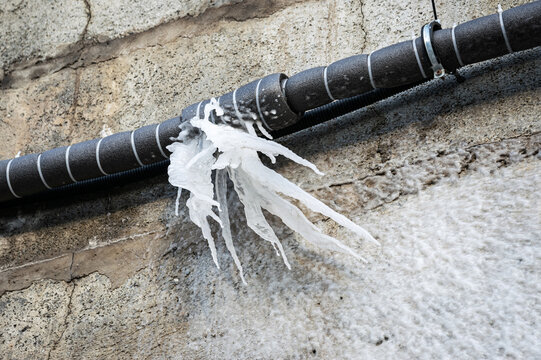Protecting Against Frozen Plumbing in Winter: Critical Advice
Protecting Against Frozen Plumbing in Winter: Critical Advice
Blog Article
The author is making a few good pointers relating to How To Avoid Freezing Pipes in general in this article just below.

Winter can wreak havoc on your pipes, especially by freezing pipelines. Right here's how to prevent it from happening and what to do if it does.
Intro
As temperatures drop, the threat of icy pipes rises, possibly causing costly fixings and water damage. Comprehending exactly how to prevent icy pipes is vital for house owners in cool environments.
Comprehending Icy Pipelines
What causes pipes to ice up?
Pipes ice up when subjected to temperatures listed below 32 ° F (0 ° C) for prolonged durations. As water inside the pipelines ices up, it increases, putting pressure on the pipeline wall surfaces and possibly creating them to burst.
Dangers and problems
Icy pipes can result in water interruptions, residential property damages, and costly repair work. Ruptured pipelines can flood homes and cause considerable architectural damages.
Indications of Frozen Piping
Recognizing frozen pipes early can prevent them from breaking.
Exactly how to determine icy pipelines
Look for decreased water circulation from faucets, unusual odors or sounds from pipelines, and noticeable frost on revealed pipes.
Prevention Tips
Protecting prone pipelines
Wrap pipelines in insulation sleeves or use warm tape to shield them from freezing temperatures. Concentrate on pipelines in unheated or external locations of the home.
Home heating strategies
Maintain indoor areas appropriately warmed, specifically locations with pipes. Open cupboard doors to allow cozy air to distribute around pipelines under sinks.
Safeguarding Outdoor Plumbing
Yard tubes and outdoor faucets
Disconnect and drain pipes garden tubes before winter season. Mount frost-proof spigots or cover outside faucets with shielded caps.
What to Do If Your Pipes Freeze
Immediate activities to take
If you suspect icy pipelines, keep faucets open to relieve pressure as the ice melts. Make use of a hairdryer or towels soaked in hot water to thaw pipelines gradually.
Long-Term Solutions
Structural changes
Take into consideration rerouting pipelines away from exterior walls or unheated locations. Include added insulation to attics, cellars, and crawl spaces.
Upgrading insulation
Buy premium insulation for pipelines, attic rooms, and wall surfaces. Correct insulation aids preserve regular temperature levels and lowers the danger of icy pipes.
Conclusion
Avoiding frozen pipelines needs proactive measures and quick feedbacks. By recognizing the reasons, signs, and preventive measures, home owners can secure their plumbing throughout cold weather.
Helpful Tips to Prevent Frozen Pipes this Winter
UNDERSTANDING THE BASICS: WHY PIPES FREEZE AND WHY IT’S A PROBLEM
Water freezing inside pipes is common during the winter months, but understanding why pipes freeze, and the potential problems it can cause is crucial in preventing such incidents. This section will delve into the basics of why pipes freeze and the associated problems that may arise.
THE SCIENCE BEHIND FROZEN PIPES
When water reaches freezing temperatures, it undergoes a physical transformation and solidifies into ice. This expansion of water as it freezes is the primary reason pipes can burst. As the water inside the pipe freezes, it expands, creating immense pressure on the walls. If the pressure becomes too great, the pipe can crack or rupture, leading to leaks and water damage.
FACTORS THAT CONTRIBUTE TO PIPE FREEZING
Low Temperatures: Extremely cold weather, especially below freezing, increases the risk of pipes freezing. Uninsulated or Poorly Insulated Pipes: Pipes located in unheated areas, such as basements, crawl spaces, or attics, are more prone to freezing. Insufficient insulation or lack of insulation altogether exacerbates the problem. Exterior Wall Exposure: Pipes running along exterior walls are susceptible to freezing as they encounter colder temperatures outside. Lack of Heating or Temperature Regulation: Inadequate heating or inconsistent temperature control in your home can contribute to frozen pipes. PROBLEMS CAUSED BY FROZEN PIPES
- Pipe Bursting: As mentioned earlier, the expansion of water as it freezes can cause pipes to burst, resulting in significant water damage.
- Water Damage: When pipes burst, it can lead to flooding and water damage to your property, including walls, ceilings, flooring, and personal belongings.
- Structural Damage: Prolonged exposure to water from burst pipes can compromise the structural integrity of your home, leading to costly repairs.
- Mold and Mildew Growth: Excess moisture from water damage can create a favorable environment for mold and mildew growth, posing health risks to occupants.
- Disrupted Water Supply: Frozen pipes can also result in a complete or partial loss of water supply until the issue is resolved.
WHY CERTAIN PIPES ARE MORE PRONE TO FREEZING
- Location: Pipes located in unheated or poorly insulated areas, such as basements, crawl spaces, attics, or exterior walls, are at higher risk of freezing.
- Exterior Pipes: Outdoor pipes, such as those used for irrigation or exposed plumbing, are particularly vulnerable to freezing as they are directly exposed to the elements.
- Supply Lines: Pipes that carry water from the main water supply into your home, including the main water line, are critical to protect as freezing in these lines can affect your entire plumbing system.
- Underground Pipes: Pipes buried underground, such as those connected to sprinkler systems or outdoor faucets, can be susceptible to freezing if not properly insulated.
https://busybusy.com/blog/helpful-tips-to-prevent-frozen-pipes-this-winter/

I found that piece on 6 Ways to Prevent Frozen Pipes when doing a search on the internet. Be sure to take the time to promote this article if you appreciated it. Thank you so much for taking the time to read it.
Call Report this page